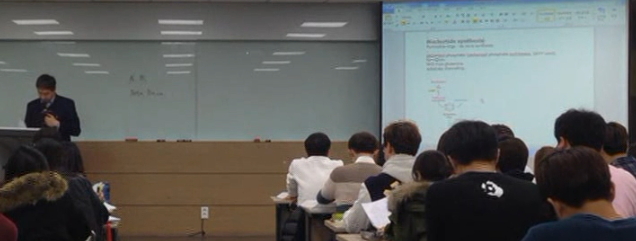Mimicking fetal nutrition is the goal of early paretneral nutrition (PN) in very low birth weight infants, however the limited metabolic capacity of immature organs raises concern about the toxicity of metabolites to the developing brain. Starting par...
http://chineseinput.net/에서 pinyin(병음)방식으로 중국어를 변환할 수 있습니다.
변환된 중국어를 복사하여 사용하시면 됩니다.
- 中文 을 입력하시려면 zhongwen을 입력하시고 space를누르시면됩니다.
- 北京 을 입력하시려면 beijing을 입력하시고 space를 누르시면 됩니다.
부가정보
다국어 초록 (Multilingual Abstract)
Mimicking fetal nutrition is the goal of early paretneral nutrition (PN) in very low birth weight infants, however the limited metabolic capacity of immature organs raises concern about the toxicity of metabolites to the developing brain. Starting parenteral amino acids from the first day of life, with a rate of 1.0 to 1.5 g/kg/day, is generally recommended to prevent endogenous protein breakdown by maintaining a positive nitrogen balance. A greater of amino acid infusion rate in the range of the fetal transfer rate (3.5-4.0 g/kg/day) is well tolerated during the early days after birth in VLBWI, however the influence on growth and long-term neurodevelopmental outcome remains unknown. Limited data are available from controlled trials regarding the effects of early supplementation with lipid emulsions on neonatal morbidity. Considering the role of long-chain polyunsaturated fatty acids in the neurodevelopment, the choice of an optimal lipid emulsion should be based on the quality as well as the quantity of the lipid contents. Little is known about the clinical benefit of higher rates of glucose infusion by permitting high serum glucose level or co-administration with insulin.
참고문헌 (Reference)
1 Lemons JA, "Very low birth weight outcomes of the National Institute of Child health and human development neonatal research network, January 1995 through December 1996" NICHD Neonatal Research Network 107 : E1-, 2001
2 Kotsopoulos K, "Safety and efficacy of early amino acids in preterm <28 weeks gestation: prospective observational comparison" 26 : 749-754, 2006
3 Gura KM, "Safety and efficacy of a fish-oil-based fat emulsion in the treatment of parenteral nutrition- associated liver disease" 121 : e678-e686, 2008
4 Wilson DC, "Randomised controlled trial of an aggressive nutritional regimen in sick very low birthweight infants" 77 : F4-F11, 1997
5 Sosenko IR, "Polyunsaturated fatty acids and protection of newborn rats from oxygen toxicity" 112 : 630-637, 1988
6 Driscoll DF, "Pharmaceutical and clinical aspects of parenteral lipid emulsions in neonatology" 27 : 497-503, 2008
7 te Braake FW, "Parenteral amino acid and energy administration to premature infants in early life" 12 : 11-18, 2007
8 Embleton ND, "Optimal protein and energy intakes in preterm infants" 83 : 831-837, 2007
9 Adamkin DH, "Nutrition Management of the Very Low-birthweight Infant: I. Total Parenteral Nutrition and Minimal Enteral Nutrition" 7 : e602-e607, 2006
10 Darmaun, "Noninvasive techniques to monitor nutrition in neonates. in: Neonatology Questions and Controversies. 1st ed" Saunders, Elsevier 2008
1 Lemons JA, "Very low birth weight outcomes of the National Institute of Child health and human development neonatal research network, January 1995 through December 1996" NICHD Neonatal Research Network 107 : E1-, 2001
2 Kotsopoulos K, "Safety and efficacy of early amino acids in preterm <28 weeks gestation: prospective observational comparison" 26 : 749-754, 2006
3 Gura KM, "Safety and efficacy of a fish-oil-based fat emulsion in the treatment of parenteral nutrition- associated liver disease" 121 : e678-e686, 2008
4 Wilson DC, "Randomised controlled trial of an aggressive nutritional regimen in sick very low birthweight infants" 77 : F4-F11, 1997
5 Sosenko IR, "Polyunsaturated fatty acids and protection of newborn rats from oxygen toxicity" 112 : 630-637, 1988
6 Driscoll DF, "Pharmaceutical and clinical aspects of parenteral lipid emulsions in neonatology" 27 : 497-503, 2008
7 te Braake FW, "Parenteral amino acid and energy administration to premature infants in early life" 12 : 11-18, 2007
8 Embleton ND, "Optimal protein and energy intakes in preterm infants" 83 : 831-837, 2007
9 Adamkin DH, "Nutrition Management of the Very Low-birthweight Infant: I. Total Parenteral Nutrition and Minimal Enteral Nutrition" 7 : e602-e607, 2006
10 Darmaun, "Noninvasive techniques to monitor nutrition in neonates. in: Neonatology Questions and Controversies. 1st ed" Saunders, Elsevier 2008
11 Blanco CL, "Metabolic responses to early and high protein supplementation in a randomized trial evaluating the prevention of hyperkalemia in extremely low birth weight infants" 153 : 535-540, 2008
12 Lehner F, "Metabolic effects of intravenous LCT or MCT/LCT lipid emulsions in preterm infants" 47 : 404-411, 2006
13 Gudinchet F, "Metabolic cost of growth in very low-birth-weight infants" 16 : 1025-1030, 1982
14 Herrera E, "Maternal lipid metabolism and placental lipid transfer" 65 (65): 59-64, 2006
15 Singhal A, "Low nutrient intake and early growth for later insulin resistance in adolescents born preterm" 361 : 1089-1097, 2003
16 Hanebutt FL, "Long-chain polyunsaturated fatty acid (LC-PUFA) transfer across the placenta" 27 : 685-693, 2008
17 Bohe J, "Latency and duration of stimulation of human muscle protein synthesis during continuous infusion of amino acids" 532 : 575-579, 2007
18 Singhal A, "Is slower early growth beneficial for long-term cardiovascular health?" 109 : 1108-1113, 2004
19 Zlotkin SH, "Intravenous nitrogen and energy intakes required to duplicate in utero nitrogen accretion in prematurely born human infants" 99 : 115-120, 1981
20 Deckelbaum RJ, "Intravenous lipid emulsions in pediatrics: time for a change?" 37 : 112-114, 2003
21 Arabi YM, "Intensive versus conventional insulin therapy: a randomized controlled trial in medical and surgical critically ill patients" 36 : 3190-3197, 2008
22 Van den Berghe G, "Intensive insulin therapy in the medical ICU" 354 : 449-461, 2006
23 Fukagawa NK, "Insulin-mediated reduction of whole body protein breakdown. Dose-response effects on leucine metabolism in postabsorptive men" 76 : 2306-2311, 1985
24 Hays SP, "Hyperglycemia is a risk factor for early death and morbidity in extremely low birth-weight infants" 118 : 1811-1818, 2006
25 Meetze W, "Hyperglycemia in extremely- low-birth-weight infants" 74 : 214-221, 1998
26 Klein GW, "Hyperglycemia and outcome in the pediatric intensive care unit" 153 : 379-384, 2008
27 Koletzko B, "Guidelines on Paediatric Parenteral Nutrition of the European Society of Paediatric Gastroenterology, Hepatology and Nutrition (ESPGHAN) and the European Society for Clinical Nutrition and Metabolism (ESPEN), Supported by the European Society of Paediatric Research (ESPR)" 41 (41): S1-S87, 2005
28 Kashyap S, "Growth, nutrient retention, and metabolic response in low birth weight infants fed varying intakes of protein and energy" 113 : 713-721, 1988
29 Clandinin MT, "Growth and development of preterm infants fed infant formulas containing docosahexaenoic acid and arachidonic acid" 146 : 461-468, 2005
30 Stephens BE, "First-week protein and energy intakes are associated with 18-month developmental outcomes in extremely low birth weight infants" 123 : 1337-1343, 2009
31 McClellan R, "Fetal nutrition: how we become what we are" 33 : 233-244, 2001
32 Clandinin MT, "Fatty acid utilization in perinatal de novo synthesis of tissues" 5 : 355-366, 1981
33 Clark RH, "Effects of two different doses of amino acid supplementation on growth and blood amino acid levels in premature neonates admitted to the neonatal intensive care unit: a randomized, controlled trial" 120 : 1286-1296, 2007
34 Maggio L, "Effects of high versus standard early protein intake on growth of extremely low birth weight infants" 44 : 124-129, 2007
35 Saenz de Pipaon M, "Effect of two amino acid solutions on leucine turnover in preterm infants" 87 : 236-241, 2005
36 Mrozek JD, "Effect of sepsis syndrome on neonatal protein and energy metabolism" 20 : 96-100, 2000
37 Thureen PJ, "Effect of low versus high intravenous amino acid intake on very low birth weight infants in the early neonatal period" 53 : 24-32, 2003
38 Denne SC, "Effect of intravenous glucose and lipid on proteolysis and glucose production in normal newborns" 269 : E361-E367, 1995
39 Kalhan S, "Effect of intravenous amino acids on protein kinetics in preterm infants" 10 : 69-74, 2007
40 Kadrofske MM, "Effect of intravenous amino acids on glutamine and protein kinetics in low-birth-weight preterm infants during the immediate neonatal period" 290 : E622-E630, 2006
41 Sosenko IR, "Effect of early initiation of intravenous lipid administration on the incidence and severity of chronic lung disease in premature infants" 123 : 975-982, 1993
42 Poindexter BB, "Early provision of parenteral amino acids in extremely low birth weight infants: relation to growth and neurodevelopmental outcome" 148 : 300-305, 2006
43 Singhal A, "Early nutrition in preterm infants and later blood pressure: two cohorts after randomised trials" 357 : 413-419, 2001
44 Simmer K, "Early introduction of lipids to parenterally-fed preterm infants" 2 : CD005256-, 2005
45 Beardsall K, "Early insulin therapy in very-low-birth-weight infants" 359 : 1873-1884, 2008
46 Beardsall K, "Early elective insulin therapy can reduce hyperglycemia and increase insulin-like growth factor-I levels in very low birth weight infants" 151 : 611-617, 2007
47 Dinerstein A, "Early and aggressive nutritional strategy (parenteral and enteral) decreases postnatal growth failure in very low birth weight infants" 26 : 436-442, 2006
48 Tessari P, "Differential effects of hyperinsulinemia and hyperaminoacidemia on leucine- carbon metabolism in vivo. Evidence for distinct mechanisms in regulation of net amino acid deposition" 79 : 1062-1069, 1987
49 Kairamkonda VR, "Controversies in the management of hyperglycemia in the ELBW infant" 45 : 29-38, 2008
50 Poindexter BB, "Amino acids suppress proteolysis independent of insulin throughout the neonatal period" 272 : E592-E599, 1997
51 te Braake FW, "Amino acid administration to premature infants directly after birth" 147 : 457-461, 2005
52 Uthaya S, "Altered adiposity after extremely preterm birth" 57 : 211-215, 2005
53 Ibrahim HM, "Aggressive early total parental nutrition in low-birth-weight infants" 24 : 482-486, 2004
54 Collins JW Jr, "A controlled trial of insulin infusion and parenteral nutrition in extremely low birth weight infants with glucose intolerance" 118 : 921-927, 1991
동일학술지(권/호) 다른 논문
-
항-HLA-B35 항체에 의한 신생아 동종면역성 혈소판 감소증 1례
- 대한신생아학회
- 최준석
- 2009
- KCI등재후보
-
- 대한신생아학회
- 오기원
- 2009
- KCI등재후보
-
Multifocal Atrial Tachycardia in a Newborn
- 대한신생아학회
- 조혜정
- 2009
- KCI등재후보
-
신생아 호흡곤란증후군에서 인공 폐 표면활성제 조기요법의 중요성과 필요성
- 대한신생아학회
- 김성미
- 2009
- KCI등재후보
분석정보
인용정보 인용지수 설명보기
학술지 이력
| 연월일 | 이력구분 | 이력상세 | 등재구분 |
|---|---|---|---|
| 2027 | 평가예정 | 재인증평가 신청대상 (재인증) | |
| 2021-01-01 | 평가 | 등재학술지 유지 (재인증) |  |
| 2018-01-01 | 평가 | 등재학술지 유지 (등재유지) |  |
| 2015-01-01 | 평가 | 등재학술지 선정 (계속평가) |  |
| 2013-07-31 | 학술지명변경 | 한글명 : 대한신생아학회지 -> Neonatal medicine외국어명 : Journal of the Korean Society of Neonatology -> Neonatal medicine |  |
| 2013-01-01 | 평가 | 등재후보 1차 PASS (등재후보1차) |  |
| 2012-01-01 | 평가 | 등재후보학술지 유지 (기타) |  |
| 2011-01-01 | 평가 | 등재후보 1차 PASS (등재후보1차) |  |
| 2009-01-01 | 평가 | 등재후보학술지 선정 (신규평가) |  |
학술지 인용정보
| 기준연도 | WOS-KCI 통합IF(2년) | KCIF(2년) | KCIF(3년) |
|---|---|---|---|
| 2016 | 0.15 | 0.15 | 0.26 |
| KCIF(4년) | KCIF(5년) | 중심성지수(3년) | 즉시성지수 |
| 0.23 | 0.2 | 0.563 | 0 |





 KCI
KCI






